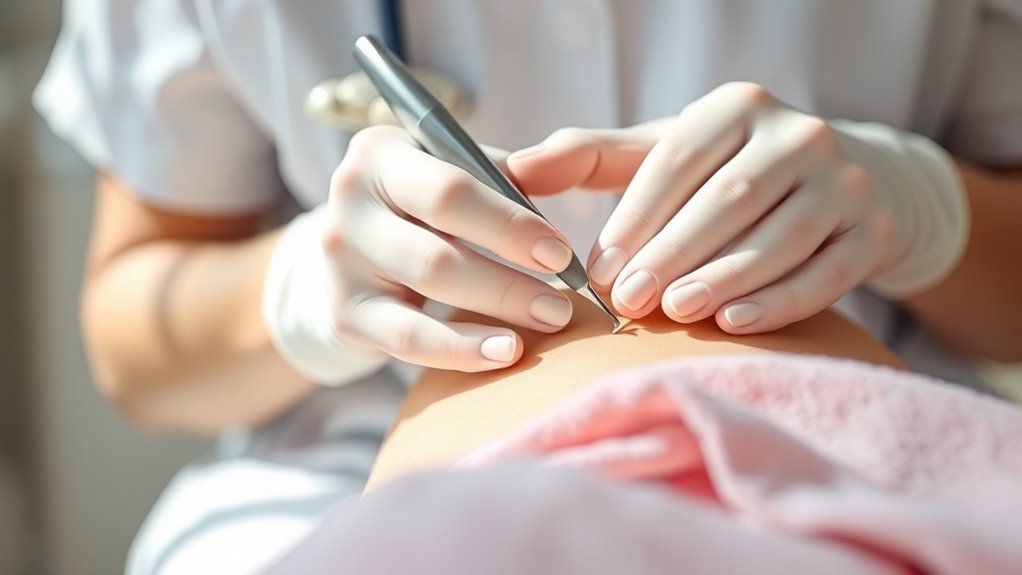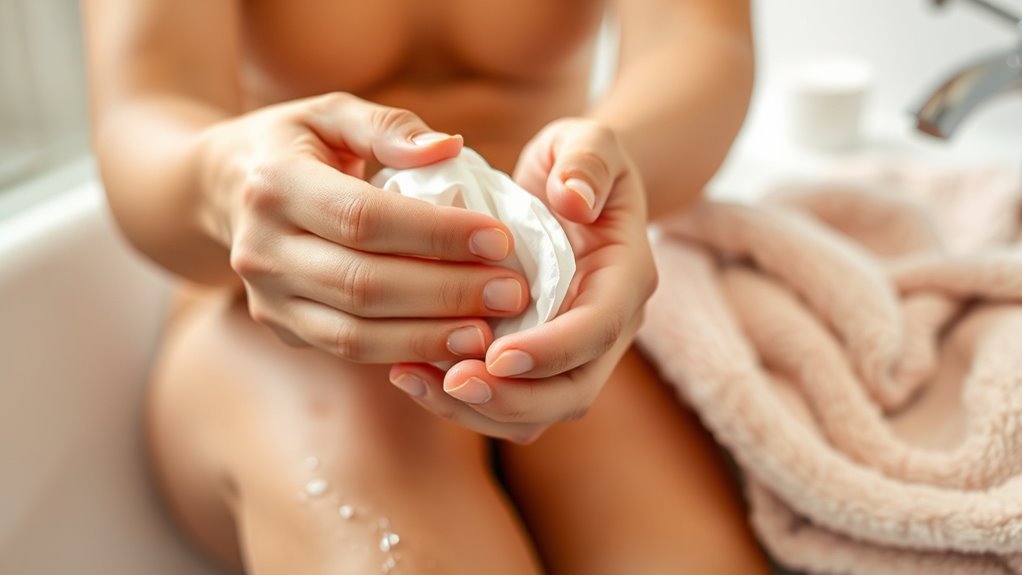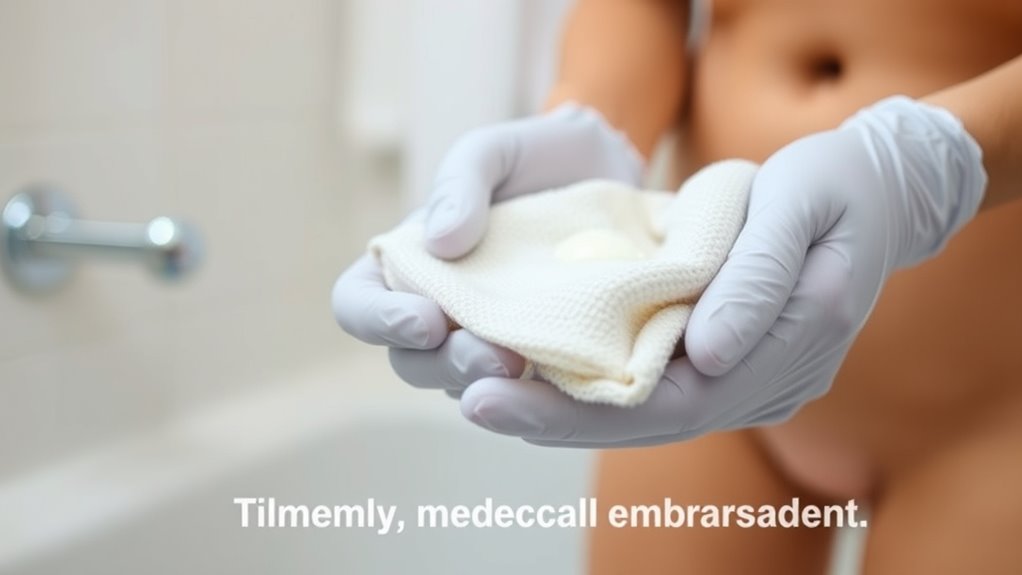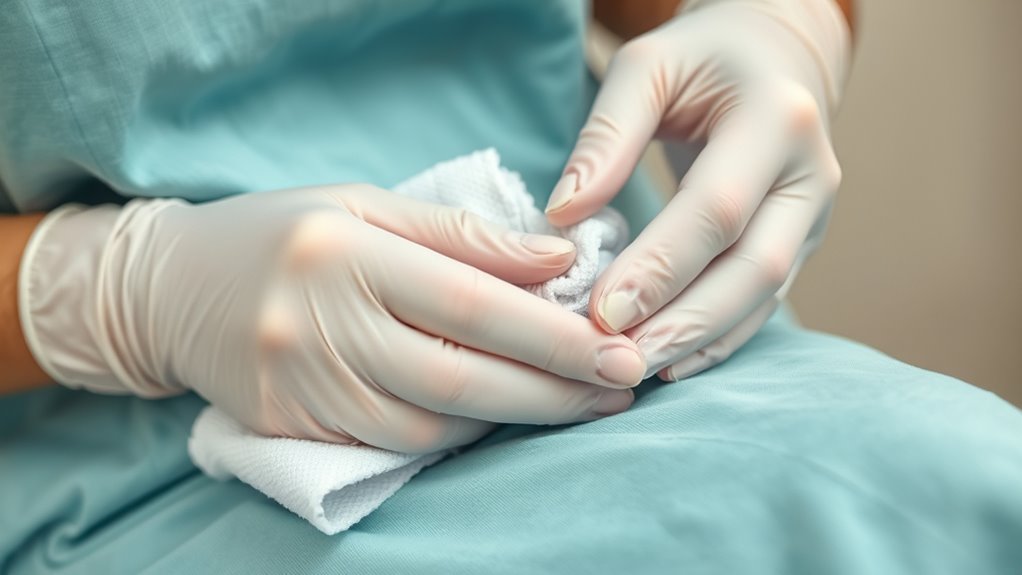Perineal care without taboos means openly discussing and practicing proper hygiene to stay healthy and prevent infections. Use gentle washing with lukewarm water and fragrance-free soap, always front to back, and pat dry gently. Wear breathable cotton underwear and change wet clothing regularly. Don’t be afraid to ask questions or seek advice—normalizing this topic helps you maintain comfort and wellness. Keep exploring to learn more about caring for this sensitive area confidently.
Key Takeaways
- Openly discuss perineal hygiene to normalize practices and reduce shame or stigma around personal care.
- Follow gentle cleaning routines using mild, fragrance-free products to maintain skin health and prevent infections.
- Avoid harsh soaps, douching, or over-washing, which can cause irritation and disrupt natural bacteria balance.
- Recognize signs of infection or discomfort early and seek professional help without hesitation.
- Promote awareness and education to empower individuals to practice proper perineal care confidently and without taboos.
Understanding the Importance of Perineal Hygiene

Understanding the importance of perineal hygiene is essential for maintaining overall health and preventing infections. When you keep this area clean, you reduce the risk of irritation, odor, and bacterial buildup that can lead to infections. Proper hygiene helps your body’s natural defenses stay strong, especially during menstruation, postpartum, or when you’re engaging in physical activities. It’s important to wash the perineal area gently with mild soap and water, avoiding harsh scrubbing that can cause irritation. Wearing breathable, cotton underwear and changing out of wet clothing promptly also support good hygiene. Additionally, data privacy concerns highlight the importance of safeguarding personal health information related to hygiene practices. By making perineal care a regular part of your routine, you’re actively protecting your health and comfort, reducing discomfort, and promoting overall well-being.
Common Myths and Misconceptions About Perineal Care

Many common beliefs about perineal care are actually misconceptions that can lead to unnecessary worry or improper hygiene. You might think that washing intensely or using harsh soaps keeps you cleaner, but this can cause irritation and disrupt natural bacteria balance. Some believe that douching or inserting anything into the vagina is necessary for good hygiene—this isn’t true and can cause infections. Others think that you must clean multiple times a day, but over-cleaning can harm sensitive skin. Many believe that perineal care is only important after childbirth or surgery, but maintaining daily hygiene is essential regardless of circumstances. Additionally, understanding proper hygiene practices can help prevent infections and maintain the natural balance of bacteria. Debunking these myths helps you avoid unnecessary discomfort and promotes healthier practices based on facts rather than misconceptions.
Step-by-Step Guide to Daily Perineal Cleansing

To maintain proper perineal hygiene, follow a simple daily cleansing routine that keeps the area clean and healthy. Begin by washing your hands thoroughly. Use warm water and a gentle, fragrance-free cleanser or mild soap. Gently spread the labia or scrotal area and cleanse from front to back to prevent infections. Rinse thoroughly to remove any soap residue. Pat dry with a soft towel, avoiding rubbing, which can cause irritation.
To ensure thorough cleaning, you may consider using a perineal spray or wash, which can help maintain hygiene and comfort throughout the day.
Enhance your routine with these practices:
- Use a separate cloth or wipe for the perineal area to prevent cross-contamination.
- Avoid harsh soaps or products with fragrances that can cause irritation.
- Apply a barrier cream if you experience irritation or moisture buildup.
Best Practices for Maintaining Comfort and Health

Maintaining comfort and health during perineal care involves adopting simple yet effective habits that support skin integrity and overall well-being. Use lukewarm water and gentle, fragrance-free cleansers to avoid irritation. Pat the area dry with a soft towel instead of rubbing, which helps prevent discomfort and skin damage. Wear breathable, cotton underwear to reduce moisture buildup and promote airflow. Change your hygiene products regularly to prevent infections and irritation. Avoid harsh soaps, powders, or douches that can disrupt the natural balance. Incorporate skin barriers or protective ointments if you experience irritation or moisture issues. Staying hydrated and maintaining a balanced diet also support skin health. Choosing the right toilet type and ensuring proper installation can further enhance comfort and hygiene. Consistency in these practices ensures comfort, reduces discomfort, and promotes long-term health.
Tips for Managing Perineal Hygiene During Illness or Postpartum

When managing perineal hygiene during illness or postpartum, using gentle cleansing techniques is essential to avoid irritation. Choose suitable hygiene products that are mild and free of harsh chemicals to protect sensitive skin. Paying attention to these details helps maintain comfort and promotes healing during this important time. Incorporating proper hygiene practices can further enhance comfort and reduce the risk of infection.
Gentle Cleansing Techniques
During illness or postpartum recovery, gentle cleansing becomes essential to prevent irritation and promote healing. You should use soft, lukewarm water and avoid harsh soaps or scrubbing. Pat the area dry carefully with a clean, soft towel instead of rubbing, reducing discomfort and irritation. Consider using a squeeze bottle or peri-bouch for controlled rinsing, ensuring thorough but gentle cleaning. Keep the perineal area exposed to fresh air whenever possible to aid healing. To enhance comfort, incorporate the following techniques:
- Use mild, fragrance-free cleansers when necessary, avoiding irritants.
- Employ a clean, soft cloth or cotton pad for gentle wiping.
- Maintain consistent hygiene routines with a focus on smooth, gentle motions.
- Paying attention to contrast ratio in your environment can help reduce visual discomfort and improve overall well-being during recovery.
These practices support healing and minimize discomfort during sensitive recovery periods.
Choosing Suitable Hygiene Products
Choosing the right hygiene products can make a significant difference in comfort and healing when caring for the perineal area during illness or postpartum. Opt for gentle, fragrance-free cleansers or simply use warm water to avoid irritation. Soft, hypoallergenic wipes can be helpful if soap isn’t tolerated, but confirm they’re alcohol and fragrance-free. Avoid harsh soaps, powders, or douches that can disrupt the natural balance or cause discomfort. Consider using a peri bottle to rinse gently after using the toilet, reducing irritation and promoting cleanliness. Cotton underwear provides breathability and reduces moisture buildup, aiding healing. If you experience soreness or swelling, ask your healthcare provider about soothing ointments or pads designed for sensitive skin. Selecting suitable products helps prevent infection and speeds recovery. Exploring best anime movies can also offer a relaxing distraction during recovery periods.
Choosing the Right Products for Sensitive Areas

What should you consider to select the safest and most effective products for sensitive areas? First, look for items labeled fragrance-free and hypoallergenic to reduce irritation risks. Next, choose gentle formulas with soothing ingredients like aloe or chamomile, which can calm sensitive skin. Finally, verify that products are pH-balanced to support your body’s natural acidity and maintain healthy tissue. Additionally, considering products with calming essential oils such as chamomile or lavender can further promote comfort and reduce irritation in delicate areas.
When to Seek Medical Advice for Perineal Concerns

If you notice persistent pain, swelling, or unusual discharge in the perineal area, it’s important to seek medical advice promptly. These symptoms could indicate an infection, injury, or other underlying issues that need professional evaluation. Don’t overlook ongoing discomfort or changes, as delaying care might worsen the condition. Watch for signs like foul odor, bleeding beyond normal, or skin redness and warmth around the area. If you experience fever or chills along with these symptoms, seek urgent medical attention. Trust your instincts—if something feels abnormal or causes significant discomfort, schedule an appointment with your healthcare provider. Early intervention can prevent complications and ensure proper treatment. Remember, seeking help is a sign of taking good care of yourself. Incorporating proper perineal care practices can also assist in maintaining health and preventing issues.
Fostering an Open Dialogue About Personal Hygiene

Creating an open dialogue about personal hygiene can considerably improve comfort and health. When you’re comfortable discussing these topics, you’ll feel more empowered to ask questions and share concerns without shame. This openness helps identify issues early and promotes better hygiene habits. To foster this dialogue, consider the following:
- Normalize conversations around hygiene as part of overall health.
- Use clear, non-judgmental language to create a safe space.
- Encourage questions and listen actively to build trust and understanding.
- Staying informed about regulations in crypto can also serve as a reminder to stay updated on health and safety guidelines in personal hygiene practices.
Frequently Asked Questions
How Often Should I Change My Perineal Hygiene Routine?
You should change your perineal hygiene routine based on your activity level and comfort. Generally, it’s best to clean the area daily, especially after bowel movements or urination, to prevent infections and irritation. If you’re more active or sweat more, consider increasing the frequency. Use gentle soap and warm water, and pat dry thoroughly. Adjust your routine as needed to stay comfortable and maintain good hygiene.
Can Perineal Care Help Prevent Infections?
Did you know that proper perineal care can reduce infection risk by up to 50%? You can help prevent infections by maintaining good hygiene. Regularly cleaning the area with gentle, pH-balanced products keeps bacteria at bay. After urination or bowel movements, make sure to wipe front to back and change your pads or underwear frequently. Consistent perineal care is a simple yet effective way to protect your health and prevent infections.
Are There Specific Techniques for Sensitive Skin?
When caring for sensitive skin, you should use gentle, fragrance-free cleansers and warm water to avoid irritation. Pat the area dry instead of rubbing, and apply a mild moisturizer if needed. Avoid harsh soaps or scrubbing, and always guarantee your hands are clean before touching the area. Using soft cloths or wipes designed for sensitive skin helps minimize discomfort and reduces the risk of irritation or injury during perineal care.
How Does Menopause Affect Perineal Hygiene Needs?
Menopause can change your perineal hygiene needs by causing thinner, drier skin and increased sensitivity. You might notice discomfort or itchiness, making gentle cleansing vital. Use mild, fragrance-free products and avoid harsh soaps. Staying well-hydrated and applying moisturizers can help maintain skin integrity. Regular hygiene practices remain essential, but adapting your routine to address dryness and sensitivity ensures comfort and reduces the risk of irritation or infection.
What Are Signs of an Underlying Perineal Health Issue?
You might notice signs like persistent redness, swelling, or soreness around the perineal area, which could indicate an underlying health issue. Unusual discharge, foul odor, or bleeding also warrant attention. These symptoms often suggest infections, irritation, or other concerns needing medical evaluation. If you experience any of these, don’t ignore them—early diagnosis and treatment help maintain your perineal health and prevent complications.
Conclusion
Taking care of your perineal area without taboos is essential for your overall health and comfort. Did you know that proper hygiene can reduce the risk of infections by up to 50%? By following simple daily practices and staying open about your needs, you can maintain your well-being confidently. Remember, there’s no shame in prioritizing your health—embrace open conversations and trust yourself to keep your perineal care routine effective and comfortable.









